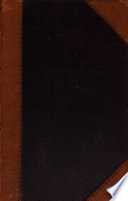 | Thomas Curtis (of Grove house sch, Islington) - 826 pages
...agitation of the insensible parts of the object, which produces in us that sensation from whence we denominate the object hot ; so what in our sensation is heat, in the object is nothing bat motion. Lneke. Hops lying undried htati them, and changes their colour. Mortimer. The heati smiths... | |
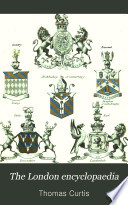 | Thomas Curtis - 1829 - 806 pages
...not stand before him ; and we find the elder contended not for the gift, but for the honour. Id. Heat is a very brisk agitation of the insensible parts of the object, which produces in us that sensation from whence we denominate the object hot ; so what in our sensation is... | |
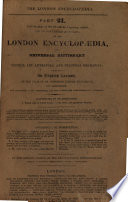 | Thomas Curtis (of Grove house sch, Islington) - 416 pages
...stand before him ; and we find the elder contended not for the gift, but for the honour. Id. Heat i* a very brisk agitation of the insensible parts of the object, which produces in us that sensation from whence we denominate the object hot; so what in our sensation is... | |
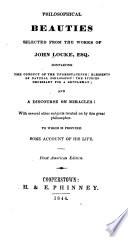 | John Locke - 1844 - 272 pages
...is the great instrument of nature, that she makes use of in most, if not all, her productions. Heat is a very brisk agitation of the insensible parts of the object, which produces in us that sensation, from whence we denominate the object hot ; so what in our sensation... | |
 | American Academy of Arts and Sciences - 1881 - 558 pages
...attractive powers.' The philosopher Locke held the same view, and expressed it elegantly, thus : ' What in our sensation is heat, in the object is nothing but motion.' Bacon's defmition of heat antedates all this, and is no less explicit. His words are : ' When I say... | |
 | American Academy of Arts and Sciences - 1881 - 508 pages
...attractive powers.' The philosopher Locke held the same view, and expressed it elegantly, thus : ' What in our sensation is heat, in the object is nothing but motion.' Bacon's definition of heat antedates all this, and is no less explicit. His words are : ' When I say... | |
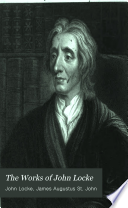 | John Locke, James Augustus St. John - 1854 - 576 pages
...is the great instrument of nature, that she makes use of in most, if not all, her productions. Heat is a very brisk agitation of the insensible parts of the object, which produces in us that sensation from whence we denominate the object hot ; so what in our sensation is... | |
 | Charles Richardson - 1856 - 952 pages
...the insensible parts of the -INO. object; which produces in us that -LESS, sensation, from whence we denominate the object hot ; so what in our sensation is heat, in the object is nothing but motion." — Locke. And the r. To cause the sensation of heat ; to warm ; to inflame; to kindle; (met) to inflame,... | |
 | American Medical Association - 1859 - 740 pages
...Suggestions/or the Interpretation of Nature, by Francis Lord Verulam. London, William Pickering, 1850. 3 " Heat is a very brisk agitation of the insensible parts of the object, which produces in us that sensation, from whence we denominate the object hot ; so what in our own sensation... | |
 | Joseph Jones - 1859 - 444 pages
...for the Interpretation of Nature, by Francis Lord Verulam. London, William Pickering, 1850. 2 " Heat is a very brisk agitation of the insensible parts of the object, which produces in us that sensation, from whence we denominate the object hot ; so what in our own sensation... | |
| |